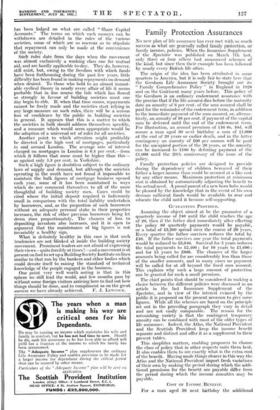Family Protection Assurances
No new plan of life assurance has ever met with so much success as what are generally called family prcitection, or family income, policies. When the Insurance Supplement of the Spectator was published on March 7th last, only three or four offices had announced schemes of the kind, but since then their example has been followed by nearly every British life office.
The origin of the idea has been attributed in some quarters to America, but it is only fair to state here that the Gresham Life Assurance Society brought out its " Family Comprehensive Policy " in England in 1928 and on the Continent many years before. This policy of the Gresham is an .ordinary • endowment assurance with the proviso that if the life assured dies before the maturity date an annuity of 6 per cent. of the sum assured shall be paid for the remainder of the endowment term, in addition to the immediate payment of the sum assured, or, alterna- tively, an annuity of 10 per cent. if payment of the capital sum be deferred until the end of the endowment term. For illustration, an annual premium of £46 Os. 10d. will assure a man aged 30 next birthday a sum of £1,000 at-the end of 20 years or earlier death, and in the latter contingency an annuity of £60 per annum will be paid for the unexpired portion of the 20 years, or the annuity can be increased to £100 by deferring payment of the £1,000 until the 20th anniversary of the issue of the policy.
Family protection policies are designed to provide during the depCndency of children bereaved of their father a larger income than could be secured at a like cost by any other means. Maximum protection at minimum cost is obtained by automatically adjusting the benefit to the actual need. A proud parent of a new born babe would be pleased by the knowledge that in the event of his own decease sufficient funds would be available to rear and educate the child until it became self-supporting.










































 Previous page
Previous page